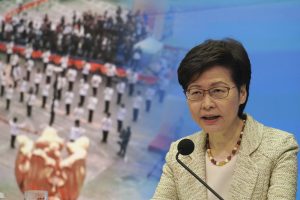In a move to ensure only “patriots” can run for positions of power in Hong Kong, Beijing finalized sweeping electoral reforms that will drastically diminish democratic representation.
China’s top legislative body on March 30 unanimously approved the “patriots governing Hong Kong” resolution by a vote of 167-0, the South China Morning Post reports, citing Tam Yiu-chung, the city’s sole representative to the body. The changes – due to take effect on March 31 – will cement Beijing’s control over Hong Kong’s electoral process, and represent the most significant government reforms since the city’s handover from Britain to China in 1997.
The plan cuts the number of directly elected seats in the legislature, which has been restructured and expanded from 70 to 90 seats. Under the new proposal, 40 members will be selected by the Election Committee that currently chooses the chief executive, making up the biggest share of seats in the legislature. The remaining seats will go to 30 lawmakers in trade-based functional constituencies and 20 from directly elected geographical constituencies. Previously, 35 out of 70 lawmakers were directly elected.
To guarantee that only “patriots” can run, a new vetting committee will be set up for aspiring candidates. The police’s national security unit and the Committee for Safeguarding National Security of the Hong Kong Special Administration Region (SAR) will help vet candidates for the legislature, the chief executive, and the Election Committee. Decisions by the vetting committee cannot be appealed or challenged by judicial review.
Chief Executive Carrie Lam said that the vetting committee will consist of a small group of top government officials, and that concerns over conflict of interest are “exaggerated,” Hong Kong Free Press reports. Candidates who are pre-approved to run in the legislative election will also need to secure at least two nominations from each of the Election Committee’s five sectors.
The Election Committee will be expanded from 1,200 to 1,500 members, with 300 new representatives included from members of China’s top political advisory body and other patriotic groups. All 117 district council seats in the political sector of the committee will be removed, and the remaining seats will stay divided between the existing political, business, professional, and social sectors, with 300 members each.
The democrats won a landslide victory in the 2019 district council elections, which would have given them control of the 117 seats previously assigned to councillors. The win came as a shock to Beijing, which has since embarked on an escalating campaign to crackdown on the city’s opposition.
Following the overhaul on March 30, Britain said that Beijing’s reforms breached the 1984 Sino-British Joint Declaration that agreed to give people in the former British colony a “high degree” of local autonomy. The statement comes after Dominic Raab, Britain’s foreign secretary, accused Beijing of multiple breaches and “ongoing non-compliance” with the declaration earlier this month.
When the changes were proposed by Beijing in early March, United States Secretary of State Antony Blinken told Congress that the Biden administration would “speak out and take action against egregious violations of democracy and human rights in Hong Kong.” Blinken also vowed to “follow through on sanctions” against “those responsible for committing repressive acts.”

































